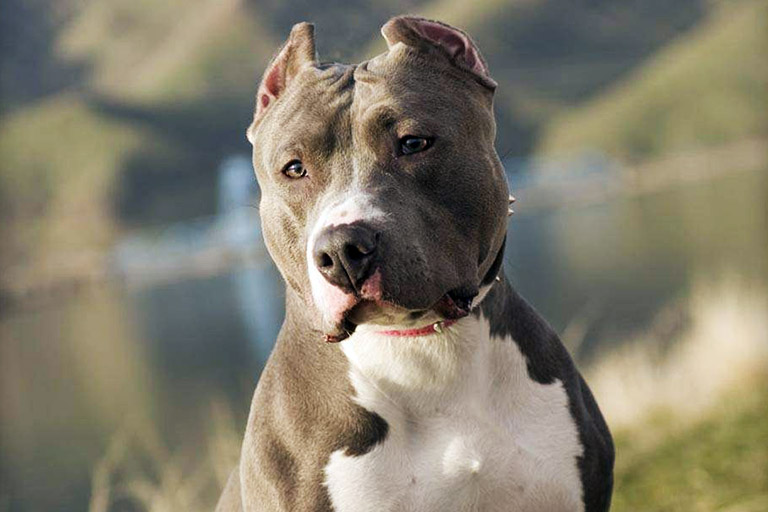
Mention the words “Pit Bull,” and an intense debate will almost inevitably follow. Unscrupulous breeding by less-than-upstanding citizens, negatively sensationalized (and often false) media accounts, and longstanding myths surrounding these types of dogs have led to their vilification. Some people, in response to misperceptions about the breed, believe that all Pit Bull-type dogs are to be feared and promote banning these breeds. Pit Bull advocates, deeply dedicated to protecting dogs they know to be friendly, loyal, loving family companions, can be as tenacious as the dogs to whom they are dedicated.
The general term “Pit Bull” refers to a number of breeds and mixes, including American Pit Bull Terriers, American Staffordshire Terriers, Staffordshire Bull Terriers, Bull Terriers, American Bulldogs, and any dogs made up of or resembling these breeds. Pit Bulls are physically powerful, strong, agile, and energetic dogs with an unrivaled joie de vivre. They are also known for the determination they bring to any task. These traits can sometimes combine to make the Pit Bull “too much dog” for an inexperienced pet parent or a family with small children, but that certainly doesn’t mean that they can’t be loving, wonderful dogs in the right homes.
Let’s take a look at some common Pit Bull myths and the corresponding realities.
MYTH: Pit Bulls have locking jaws.

Reality: Pit Bulls do not have any special physical mechanism or enzyme that allows them to “lock” their jaws. If you compare a Pit Bull skull to a skull of any other dog breed, you can see with the naked eye that both skulls share the same characteristics and general bone structure. However, one personality trait of the Pit Bull breed is determination. Whatever Pit Bulls do, they do it with a great deal of enthusiasm, and it is this trait that can make it seem like they have a locking jaw when they bite down on something and are determined not to release it.
Additionally, in a test of biting pressure that included a German Shepherd Dog, a Rottweiler, and an American Pit Bull Terrier, the American Pit Bull Terrier had the least amount of bite pressure.
MYTH: Pit Bulls are all inherently vicious.
Reality: This is a stereotype that is biased toward generalizing and condemning an entire breed based on the actions of a few bad people. The truth is that each dog should be evaluated by his own merits and not by his breed. A corollary truth is that there truly are no bad dogs, only bad people. In his essay Troublemakers, Malcolm Gladwell discusses what Pit Bull stereotypes can teach us about the wrongness of racial profiling of both humans and dogs.
There is no room for human aggression in a behaviorally sound Pit Bull, and the reality is that most Pit Bulls are not aggressive toward people; many are extremely sociable and adore children. A Pit Bull who passes a behavioral evaluation poses no more of a threat to people than any other large dog. The American Temperament Test (see The American Temperament Society at www.atts.org) shows that Pit Bulls consistently score above the average for all breeds tested over the years. As of December 2007, American Pit Bull Terriers had a pass rate of 84.3 percent compared to a pass rate for all breeds tested of 81.6 percent.
MYTH: A Pit Bull that is aggressive toward other dogs will also be aggressive toward humans.
Reality: Dog-aggression and people-aggression are two distinctive traits and should not be confused. Unless a Pit Bull has been poorly bred or purposefully trained to attack humans, they generally love people. They are, in fact, one of the most loving, loyal, friendly and dedicated companions you can have.
MYTH: It is better to adopt a Pit Bull puppy instead of an adult.

Reality: It’s a fact that puppies are adorable! But the thing about puppies is, well, they grow up. And as they mature, their personality develops and that’s when you really find out whether your Pit Bull is dominant or submissive with people, or whether she is aggressive toward some, none or all dogs. Dog-intolerance and dog-aggression are traits that do not develop in some dogs until they are fully mature. It is possible that the cute little puppy you adopt who is friendly with all other dogs may not like other dogs at all later in life, even dogs she has grown up with and lived with for her entire life. Both nurture (environment) and nature (genetics) play a role in determining a dog’s mature personality. This doesn’t mean that Pit Bull puppies should not be adopted, but if you want to know how big your dog will ultimately be and how she will act around humans and other animals, you may want to consider adopting an adult.
While behaviorally sound Pit Bulls make excellent family companions, the reality is that adopting a Pit Bull does require some special considerations:
- Dog-to-dog aggression can be an issue with these dogs, and despite your best socialization efforts, a Pit Bull may become dog aggressive upon reaching maturity (roughly two years old). This will affect your ability to have other pets in your home as well as your responsibility for ensuring that your dog never has the opportunity to injure someone else’s beloved pet.
- Pit Bulls face misunderstanding and prejudice from many people who do not know much about them, so adopting one requires a willingness to consider your friends’ and neighbors’ concerns and to educate them about Pit Bulls in general and your dog in particular.
The reality is that, as with all breeds, there are great Pit Bulls and Pit Bulls who–due to poor breeding, handling, or socialization–are not suitable as pets. While we urge shelters and rescue groups to perform a behavioral assessment on all dogs who enter their programs, it is particularly important to be sure that this has been done with the Pit Bull you are going to adopt. While a mistake in judgment with even a small dog can have serious consequences, a similar mistake with a large, strong breed such as a Pit Bull (or Akita, Rottweiler, Mastiff, Labrador Retriever, etc.) can be deadly.
Prejudice and discrimination can extend beyond individuals, and in some places can include local legislation banning Pit Bulls from the community. Be sure to check local laws before adopting and before moving with your Pit Bull. Securing homeowners’ insurance can also be more of a challenge if you live with a Pit Bull, but there are insurance companies that do not discriminate based on the breed of dog.
If you are prepared, know your local laws, and have decided that a Pit Bull is a good fit for your family, do consider adopting one from a shelter or rescue group who carefully evaluates their dogs. Ultimately, the decision to adopt any dog requires much thought on what is the right fit for your family, and your ability to commit to the dog for his or her lifetime.





Leave a Reply